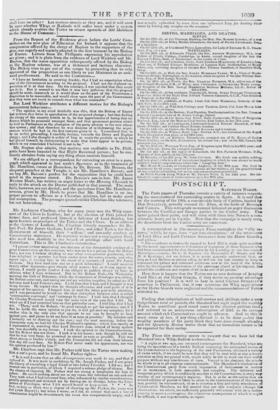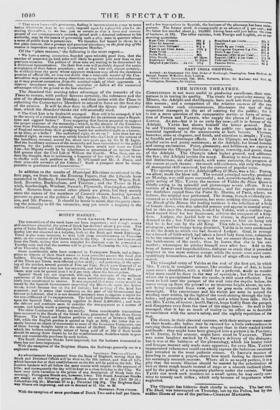The Times this morning seems to sust ect that we
have led the Standard into a Whig-Radical ambuscade- " A night or two ago, our esteeaned contemporary the Standard, when no- ticing the speculations of a weekly Radical respecting the anticipated tactics of the Conservatives in the beginning of the new Parliament, advanced a variety of views which, if we could be sure that they will be read with as nice a deem. tuination as they are penned with, might solely be left to work out their useful purpose without any interference of tons. Viewed in the abstract, the al ticks we allude to is in all respects unexceptionable. The Standard's vindication of the Coostitutional party from every imputation of factiousness in motive or in movement, is both seasonable and complete. The defensive and temperate policy which it confidently ascribes to the Conservatives, is every way worthy of our contemporary's sagacity. But in as far as the notion that no serious collision of parties is likely to occur in the commencement of the session' may possibly be misconstrued, so as to occasion a thin and tartly attendance of Conservative 'Members, we feel assured that our able coadjutor (though hie observations, we admit, are sufficiently guarded) will coucur with us in einlea. voila dig to avert a contingency the calamitous consequences of which it !night be difficult, if not impracticable, to repair. " That -4e iirsh'e gentieiren, finding it inconvenient to come to town before Ci.ri•rnots. may lie too easily imposed upon by a plaitsilde plea ter ab- senting theitiselres, itt, we fear, just as certain as that a lome and cursory perusal of our couteniporary'a remarks, joined with a derserved oeference to his authority, may be the means of generating such a plea. even in quarters where a sense of public duty is paramoupt. We therefore feel bound to show, by a few .plain reasons, that a prompt and punctual attendance on the first day of the session is imperative upon every Conservative Member."
Of the "plain reasons," the following is the most cogent— "We have a strong conviction, founded upon tolerably good data, that the number of waverer, on both sides will likely be greater just now than en any previous occasion. The politics of these men are waiting to be determined by • divisional demonstration. On their first vote will probably depend the entire ample:bin of their future procedure ; and as that vote will, almost certainly, be withheld from the party whose apparent weakness may afford the slenderest promise of official life, no man can doubt that a miserable muster of the Con- servatives may occasion as many desertions among their understood adherents as it may prevent accessions from the nominal ranks of their opponents. A dilatory attendance may, therefore, neutralize or forfeit all the numerical advantages which we gained at the late elections."
The Standard this evening takes advantage of the remarks of the Times to restate, with perfect fairness certainly, the substance arid the aim of its observations on Monday ; and then unites with the Times in exhorting the Conservative Members to attend in force on the first day of the session. It will be their duty to afford the Queen that protec- tion, which the Standard thinks she will assuredly need.
" The Civil List is be forthwith arranged. How will it be arranged, if left to the mercy of a wretched Cabinet, dependent for its existence upon a Repub- lican and niggard faction? Even supposing that faction prepared to suppoit the proper expenses of the monarchy—which, in the absence of the Conserva- tives from Parliament, they certainly would not be—is it fitting that the Queen of England receive from their grudging hands her undoubted right as a bounty, or an alms, or a bribe ? Her undoubted right, do we say ? Less than her un- doubted right, as every one may satisfy himself who sbail look at the returns of the hereditary revenue, moved for, about two years ago, by Sir R. II. Inglis. Had the hereditary revenues of the monarchy not been surtendered to the public service, for the public convenience, the Queen would now want no Civil List—her Majesty would be by inheritance in possession of an income three- fold greater than the Civil List of William the Fourth. Who, then, can en. dune the thought, that in reclaiming a fragment of her right, she sh ill be left to chaffer with such peddlers as Mr. D. O'Connell and Mr. J. Hume, and their miserable servants of the Cabinet? Such a prospect must be insup- portable to gentlemen and Conservatives."



























 Previous page
Previous page